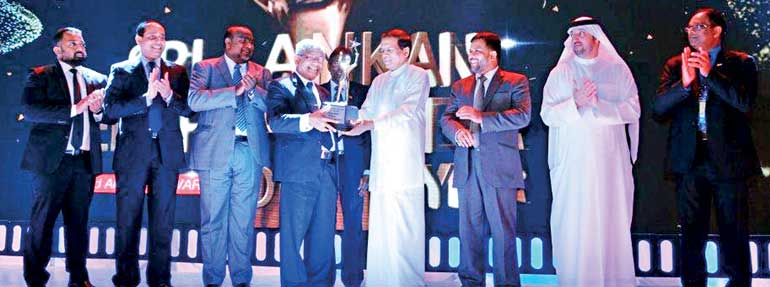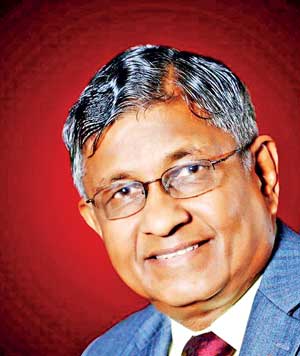Monday Feb 16, 2026
Monday Feb 16, 2026
Tuesday, 16 January 2018 00:00 - - {{hitsCtrl.values.hits}}

Kulathunga Rajapakse is no stranger to Sri Lanka’s industry and entrepreneur circles. As Managing Director of the DSI Samson Group, the country’s premier business conglomerate and leading manufacturer of footwear and bicycle tyres in Sri Lanka, he overlooks 32 companies while occupying patron level positions in national organisations for industries. His invaluable contribution in shaping Sri Lanka’s industry economy and leadership in addressing key issues on behalf of entrepreneurs gained recognition recently at the 22nd Sri Lankan Entrepreneur of the Year Awards organised by the Federation of Chambers of Commerce and Industry of Sri Lanka (FCCISL). Kulathunga Rajapakse was awarded the lifetime ‘Hall of Fame’ award by President Maithripala Sirisena.
Following the reception of the prestigious award, this impressive industrialist shares his thoughts about the business he built with his family and the industrial landscape of the island. Below are excerpts:
Q: What does it mean to receive the ‘Hall of Fame’ Award?
A: This award is a lifetime award given to entrepreneurs who have contributed immensely to the country’s economy as well as served the society in many ways. I have been in the industry for over 50 years and have steered the DSI Samson Group to what it is today. Back in 1994 I received the first ‘Entrepreneur of the Year’ Award and now the ‘Hall of Fame’. This alone is testament enough to my contribution to the industry, and I humbly thank the FCCISL for selecting me for the award.
Q: The DSI Samson Group is one of the leading local business conglomerates today. Can you recollect the beginning of this long journey?
A: From our very inception and throughout the development of DSI, we have continuously transformed challenges into opportunities and taken risks by venturing into territories others have not considered. These two features have been our keys to success.
Our first factory was established in 1962 to overcome the restrictions posed by the Government on imports. As a result of a suffering Foreign Exchange situation, the importing of finished products were highly restricted, whereas importing raw material and machinery were encouraged in order to set up industries with the aim of developing the local economy. We took on this challenge and ventured into manufacturing, and set up our first factory in my father’s hometown, Galle.
Q: From a challenging beginning, how did the DSI Samson Group grow?
A: In response to a political threat we faced within the electorate and the Business Acquisition Act, which was passed in Parliament, in 1980 we considered moving out of the electorate and founded a new footwear manufacturing plant in Colombo, under a different name and a totally new Board of Directors. This was the birth of Ranpa. This threat resulted in us having a higher import quota and a substantial share of the market because both factories were manufacturing the same product.
We also launched our very own ultra-modern Design Department, to tackle increasing competition. With the investment on our own retail outlets we acquired first-hand feedback on the movement of our designs, which was highly important for production. Thus, our retail network was expanded across the island.
With the Open Economy being introduced in 1977 we faced new threats, as many started to import finished footwear and the market prices began to drop. The local footwear industry suffered immensely. However, customers realised that the cheap imports were not durable and reverted to locally manufactured footwear. Our school shoes were one of the products, which could not be matched. Nonetheless, this challenge led us to re-look at our own products, the productivity of our manufacturing lines by increasing the TAT, as well as our designs, since we had to compete with foreign products. It was actually a blessing in disguise because we improved significantly during this time.
Q: When did DSI step into the Export market?
A: This too was initiated as a response to a challenge. The Ministry of Industry was encouraging exports at the time, and it was also the period of the Arab – Israel conflict. The Arab countries were limiting their imports to countries that were not suppliers to Israel, and through this, we received our first export consignment to Saudi Arabia in 1970. Following this period the BOI in Katunayake was launched. DSI was affected by it, as we could not convince foreign buyers to travel to our factory in Galle. Taking this threat into consideration we opened our factory in Kalutara, purely for exports. This factory is to date the most efficient and productive one, as it was well planned and built with state-of-the-art facilities.
Q: The DSI Samson Group is not restricted to footwear anymore. When and how did diversification start?
A: As a step of backward integration we invested in a rubber plant to produce material for our footwear manufacturing. However, the machines produced high quantities, which were excess for our requirement of rubber soles. Therefore, we sought out a product that could be manufactured with the same material. The DSI bicycle tyre is an outcome of this and has grown to Vechenson Ltd. and Samson Rubber Industries Ltd.
The Sri Lankan Government also promoted the export of garments. On studying the process we noted that the main operation in both garment and footwear manufacturing was sewing. Since the factories were already equipped with sewing machines and technicians, we expanded into the apparel sector with ease with Globe Knitting Ltd.
As the group expanded locally, the DSI brand was gaining recognition in the international market as well. This resulted in us receiving offers for joint ventures. We signed a strategic partnership with a company in Belgium to manufacture coir brushes. Samtessi Brush Manufacturers Ltd. was a successful decision since all the raw material could be found locally.
Along with the Civil War in Sri Lanka, there were extensive threats, especially to the Colombo Port. All our businesses depended on the import of material and export of finished products, and the Port was a crucial location. With bomb threats looming, it was time to look at a purely local manufacturing component, which would not be affected by a closure of the port. DSI was keen to undertake an industry that had not been developed and we came across roof tiling. The factory was constructed close to a tank in Nachchaduwa, which was de-silted to procure the raw material – clay. Today, Samson Rajarata Tiles owns the best ultra-modern tile manufacturing factory in South Asia, and produces high quality, unique and modernised roof tiles.
As a whole the group has also evolved to energy, professional services, beverage and agriculture products, packaging, technology and engineering. We export to over a 100 countries, with sales offices in Dubai, Australia and the UK.
Q: As such a diversified group, how has DSI maintained its consolidated Brand image?
A: Strategically we practice umbrella branding through our corporate brand, DSI. This enables us to defend the market segment. Individual and sub branding is used for our diversified products. Our CSR brand remains ‘Samson’, in honour of our founder and Chairman, my father, the late D. Samson Rajapakse, and activities are carried out under the Samson Foundation. We also have international brands such as Fila, Clarks, Puma, Reebok, Raleigh, Jac, Garware, Vardhaman, Next and Migrow, from all industries. These enhance our brand portfolio.
Q: Apart from the DSI Samson Group, you hold responsibilities in several national level organisations. How important are these associations for an industry to grow?
A: As a company DSI has been a member of the Sri Lanka Chamber of Small and Medium Industries, the National Chamber of Commerce of Sri Lanka and subsequently the National Chamber of Exporters of Sri Lanka, ensuring our membership as the business grew. I have represented the various sectors, footwear, rubber and others, in the Chambers. It is crucial that entrepreneurs and companies join these national bodies in order to collectively address issues pertaining to the industry. They also serve as knowledge and experience sharing platforms, which is beneficial to the new entrants.
Q: In your opinion, is present Sri Lanka an encouraging environment for entrepreneurs?
A: I would say that Sri Lanka has high potential but is not interested in creating a conducive environment for entrepreneurs. The present banking system, though one of the most developed in the region, still prefers financing the trading sector to industries. The loan portfolios serve a very low percentage for agriculture and manufacturing. It is paramount that we introduce a two-tier interest rate, which will benefit both categories. The SMEs are discouraged in the form of limitations when applying for loans.
Currently there is much interest in FTAs. However, Sri Lanka as a country has not been able to reap the benefits of these agreements until now. Bilateral arrangements would be more favourable for our economy.
It is equally important to protect the local market. An industry has to be stable within the local market before it ventures to exports. Unfortunately, at present we have come to a position where even kites and Vesak lanterns are being imported. These are products that can easily be manufactured in the local market. For example, the brassware industry is still a cottage industry and is in a very primitive stage. The state has to invest and develop such industries. Simultaneously, the infrastructure of the country, the roads and railway need to be improved.
Q: We see an increasing interest in start-ups at present. How do you see this concept affecting our economy?
A: Start-ups and the advocating of entrepreneurship from the initial stage are very important to the industry economy of any nation. New entrants face many challenges, as there are no venture capital agreements or rebates provided by the Government. The development of technology has to go hand-in-hand with this, since we are in a world that is governed by ICT. It is the responsibility of the state and existing industries to help the start-ups by identifying bottlenecks and funding feasible solutions. At DSI we regularly invite undergraduates to visit our factories and report back on their observations. There is always something to learn when a fresh pair of eyes evaluates it.
The key characteristics of a successful entrepreneur are risk taking, embracing innovation and a mindset that is ready to evolve. These features need to be actively reinforced in order to build a strong industrial economy, which in turn will be favourable to the nation as a whole.